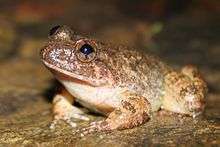Dicroglossidae
The frog family Dicroglossidae[1][2] occurs in tropical and subtropical regions of Asia and Africa, with most genera and species being found in Asia. The common name of the family is fork-tongued frogs.[1]
| Dicroglossidae | |
|---|---|
 | |
| Quasipaa exilispinosa | |
| Scientific classification | |
| Kingdom: | Animalia |
| Phylum: | Chordata |
| Class: | Amphibia |
| Order: | Anura |
| Clade: | Ranoidea |
| Family: | Dicroglossidae Anderson, 1871 |
| Subfamilies | |
|
Dicroglossinae | |
The Dicroglossidae were previously considered to be a subfamily in the family Ranidae, but their position as a family is now well established.[1][2][3]
Subfamilies and genera
The two subfamilies contain 213 species in 13–15 genera, depending on the source.[3][1]
Dicroglossinae Anderson, 1871 — 197 species in 12 genera:[4]
- Allopaa Ohler and Dubois, 2006 (two species)
- Chrysopaa Ohler and Dubois, 2006 (one species)
- Euphlyctis Fitzinger, 1843 (eight species)
- Fejervarya Bolkay, 1915 (13 species)
- Hoplobatrachus Peters, 1863 (five species)
- Limnonectes Fitzinger, 1843 (74 species)
- Minervarya Dubois, Ohler, and Biju, 2001 (38 species)
- Nannophrys Günther, 1869 (four species)
- Nanorana Günther, 1896 (30 species)
- Ombrana Dubois, 1992 (one species)
- Quasipaa Dubois, 1992 (11 species)
- Sphaerotheca Günther, 1859 (ten species)
Occidozyginae Fei, Ye, and Huang, 1990 — 16 species in two genera:[5]
- Ingerana Dubois, 1987 (four species)
- Occidozyga Kuhl and Van Hasselt, 1822 (12 species)
Phylogeny
The following phylogeny of Dicroglossidae is from Pyron & Wiens (2011).[6] Dicroglossidae is a sister group of Ranixalidae.[6]
| Dicroglossidae |
| ||||||||||||||||||||||||||||||||||||||||||||||||||||||
gollark: Excellent. Good imagination throughput.
gollark: ????
gollark: And not NPM!
gollark: At least Python has slightly stronger types!
gollark: JS is *better*?!
References
- Frost, Darrel R. (2014). "Dicroglossidae Anderson, 1871". Amphibian Species of the World: an Online Reference. Version 6.0. American Museum of Natural History. Retrieved 26 January 2014.
- "Dicroglossidae Anderson, 1871". Integrated Taxonomic Information System.
- "Dicroglossidae". AmphibiaWeb: Information on amphibian biology and conservation. [web application]. Berkeley, California: AmphibiaWeb. 2014. Retrieved 26 January 2014.
- Frost, Darrel R. (2014). "Dicroglossinae Anderson, 1871". Amphibian Species of the World: an Online Reference. Version 6.0. American Museum of Natural History. Retrieved 26 January 2014.
- Frost, Darrel R. (2014). "Occidozyginae Fei, Ye, and Huang, 1990". Amphibian Species of the World: an Online Reference. Version 6.0. American Museum of Natural History. Retrieved 26 January 2014.
- R. Alexander Pyron; John J. Wiens (2011). "A large-scale phylogeny of Amphibia including over 2800 species, and a revised classification of extant frogs, salamanders, and caecilians". Molecular Phylogenetics and Evolution. 61 (2): 543–583. doi:10.1016/j.ympev.2011.06.012. PMID 21723399.
This article is issued from Wikipedia. The text is licensed under Creative Commons - Attribution - Sharealike. Additional terms may apply for the media files.